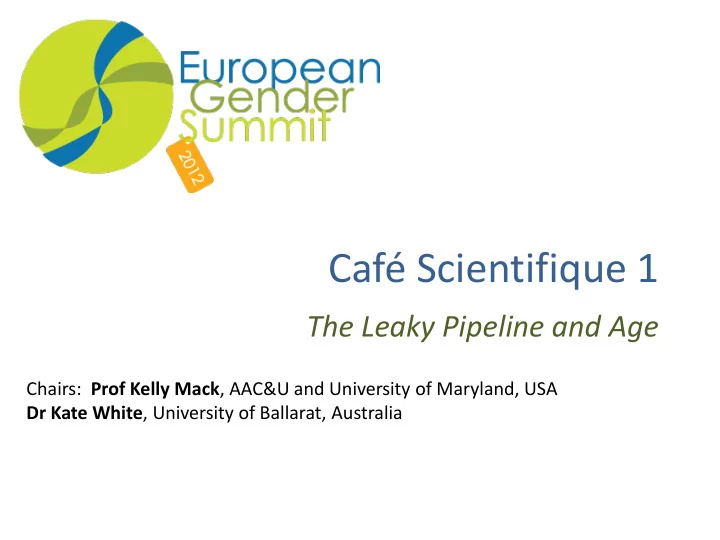

Café Scientifique 1 The Leaky Pipeline and Age Chairs: Prof Kelly Mack , AAC&U and University of Maryland, USA Dr Kate White , University of Ballarat, Australia
Café Format I. Aim To hold an informal, informed and inclusive debate exploring the ‘leaky pipeline’ phenomenon through the lens of ‘age issues’ II. Welcome/Introduction Mr. Martin Hynes, CEO of the European Science Foundation III. Setting the scene Short presentations from the members of the chairing panel Brief presentations from 3-4 invited participants Some possible starting ideas for the debate are included in the Briefing Notes placed on the tables IV. Expected output Diversity of views and viewpoints Examples and case studies Policy recommendations that can provide the material for developing new advocacy arguments to strengthen the support for gender mainstreaming policies and actions in science
Why Do We Need To Think About Age and a Science Career – and Gender ? The length of PhD study is much longer in some countries/disciplines than others – how does this impact on women? Average Age at Time of Degree Registered Time to Degree Average Age = 34.0 years Average 7.4 Years to PhD
Why Do We Need To Think About Age and a Science Career – and Gender ? Is there a time expectation in how long the research ‘track record’ should be to achieve recognition as an independent researcher – is it different for women? What are the time limits that define a scientist’s career development milestones – and are they different for women Age at first R01 = 42 years old Sally Rockey, NIH Deputy Director for Extramural Research
Why Do We Need To Think About Age and a Science Career – and Gender ? What is better for science: a compulsory retirement, which would remove barriers for women’s advancement to leadership role; or non -compulsory retirement, which would allow (mainly men) to continue in their leadership roles? Age Distribution of US Scientists and Engineers
Why Do We Need To Think About Age and a Science Career – and Gender ? Do repeated post docs create a time penalty on a career success – should women choose engineering rather than life sciences? How many months have you been working as a postdoc? Men 29.3 Women 28.8 How did you rate the importance of the following? Not At All Somewhat Very Important Salary Men 11.3 53.1 33.6 Women 15.8 54.6 27.4 Family Men 22.0 34.2 39.2 Women 18.4 30.7 45.4 Geography Men 19.2 42.5 37.2 Women 11.9 32.8 53.4 Sigma Xi National Postdoc Study
Why Do We Need To Think About Age and a Science Career – and Gender ? Is the traditional career development path/time sequence the main barrier to combining family and career responsibilities – should we have more schemes for returning to research after a family-related career break (for men and women) NSF Career Life Balance Initiative Provides for: No-cost extensions to funded awards when the extended absence of a PI or co-PI is necessary Supplemental funding to support additional personnel to sustain research when the PI is on family leave Support for the salaries of project support personnel that replace individuals who take a leave of absence due to dependent-care responsibilities
Why Do We Need To Think About Age and a Science Career – and Gender ? …..your views, comments, ideas, recommendations
Recommend
More recommend